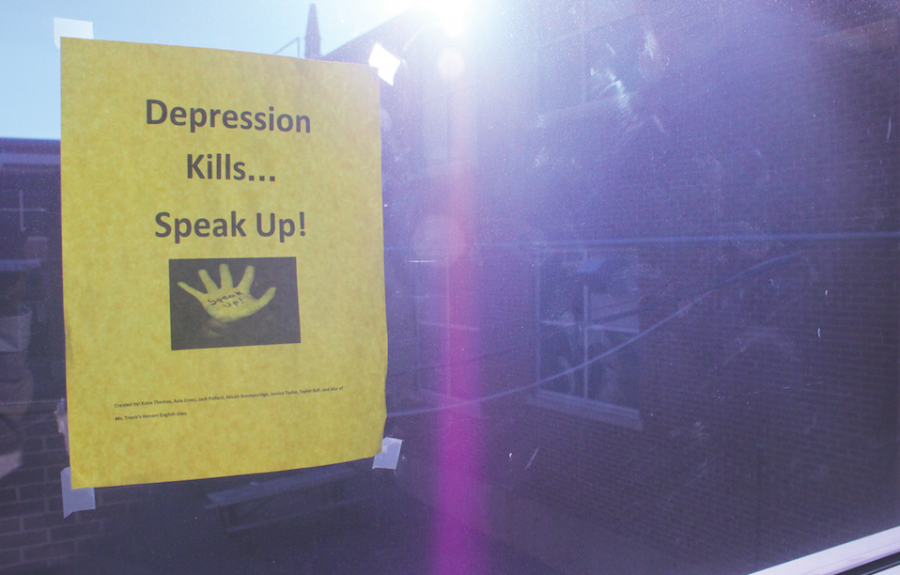A flaw in chemistry– not character
“Depression Kills…”
“You are not alone.”
“Speak out!”
It is hard not to notice the abundance of depression awareness flyers posted around the school recently. This is appropriately so. Feeding into the ever prevalent stigma surrounding mental illness, many people, students and teachers alike, fail to register the seriousness and validity of mental health-related issues among high school students.
The World Health Organization has recently released the results of a study listing the top 10 causes of disability for adolescents. Among these causes are road traffic injuries, asthma, anaemia, and HIV/AIDS. Those all sound pretty accurate, right? But what happens to be the number one cause of this list?
You guessed it– depression.
Now wait a minute. Isn’t the study supposed to be about causes of disability in adolescents? Some may wonder, “Does depression really count as a disability?”
The most widely accepted definition of a “disability” is something that physically disables a person to complete everyday activities. However, the dictionary defines disability as, “a physical or mental condition that limits a person’s movements, senses or activities.”
Key word: mental condition.
Mental illnesses like depression and anxiety do indeed limit a person’s movements, senses and activities, as the symptoms are not only emotional, but also physical. The most debilitating symptoms of depression include not only sadness, hopelessness, self-hatred and guilt, but also fatigue, appetite changes, irregular sleep patterns, weight gain or weight loss and unexplained bodily aches and pains.
Depression and anxiety both affect concentration and memory, hinder the ability to make decisions, and produce intrusive thoughts of self-harm. Not to mention the complete lack of motivation that makes it difficult to complete even the smallest task.
We all know how it feels to not want to get out of bed in the morning, but the grip of depression makes this difficulty, known in the psychological realm as dysania, a near impossibility. Anhedonia, a medical term used to describe the inability to feel pleasure, results in isolation and the loss of friends for many sufferers of depression. The emotional effects alone are enough to have a detrimental affect on a student’s performance in school and the physical ailments only worsen the emotional distress.
Together these factors create a devastating matrix of pain and suffering which can prevent a student from functioning normally.
But what can be done about it?
People are told to speak out, but this is easier said than done. Due to criticisms and lack of understanding from peers, teachers and even family members, students who suffer from mental illness often feel ashamed of their struggles, discouraging them from reaching out for help and forcing them to suffer alone. One bad night struggling with depression could cause a student to be incapable of studying for an important test. As a result, they fail the test and can subsequently fail the class.
And what about missing school? We’ve all had what people refer to as a “mental health day,” a day where you just need to stay home and sleep in and catch up on work (or binge on Netflix) to take a temporary break. But what about those students who actually need a literal mental health day? As in, it would be harmful to their mental and emotional well being to force themselves to go to school that day, rather than give themselves a necessary break. Are those absences excused? Should they be?
In most circumstances, when provided with a note from a parent or doctor, it is considered as an excused absence and teachers are willing to work with the student. Sometimes, but not always.
Sometimes when asked for an explanation for their poor performance in class, students shy away from opening up and revealing their issues, as they have been convinced that their depression is not a “real” disability. They may not even be aware that they have depression. They are told that maybe it’s just an attitude problem or that they just need to think more positively, when this is definitely not the case.
Because students often feel that taking breaks from school or getting extra help and time on assignments is not justified, they begin to feel even more hopeless. Lacking a proper support system and the options of temporary relief, they look toward more permanent forms of relief– like suicide. Students who deal with depression, anxiety, eating disorders or other mental health maladies are more at risk to attempt suicide, commit suicide, or drop out of school.
The posters you’ve seen around school are right. Depression kills, as do many other mental illnesses.
The reality of these issues as a disability is made more clear after taking time to inform oneself on the true nature of mental illness. The difficulties it poses for students is a very real thing, and is a serious issue that needs to be addressed.
For those who are suffering and feel misunderstood or unsupported, there are hotlines you can call and even online chat rooms where trained professionals are willing to listen and try to help.
It’s important to remember that even though you may feel you are, you really are not alone.
There is always hope.
Keep fighting, Spartans.
Your donation will support the student journalists of White Station High School. Your contribution will allow us to purchase equipment and cover our annual website hosting costs.






































